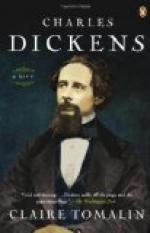And who was glad one evening—which would be about the last evening in June, or the first of July—when a hackney coach rattled up to the door of the house in Devonshire Terrace, and four little folk, two girls and two boys, were hurried down, and kissed through the bars of the gate, because their father was too eager to wait till it was opened? Who were glad but the little folk aforementioned—I say nothing of the joy of father and mother; for children as they were, a sense of sorrowful loss had been theirs while their parents were away, and greater strictness seems to have reigned in the good Macready’s household than in their own joyous home. It is Miss Dickens herself who tells us this, and in whose memory has lingered that pretty scene of the kiss through the bars in the summer gloaming. And she has much to tell us too of her father’s tenderness and care,—of his sympathy with the children’s terrors, so that, for instance, he would sit beside the cot of one of the little girls who had been startled, and hold her hand in his till she fell asleep; of his having them on his knees, and singing to them the merriest of comic songs; of his interest in all their small concerns; of the many pet names with which he invested them.[17] Then, as they grew older, there were Twelfth Night parties and magic lanterns. “Never such magic lanterns as those shown by him,” she says. “Never such conjuring as his.” There was dancing, too, and the little ones taught him his steps, which he practised with much assiduity, once even jumping out of bed in terror, lest he had forgotten the polka, and indulging in a solitary midnight rehearsal. Then, as the children grew older still, there were private theatricals. “He never,” she says again, “was too busy to interest himself in his children’s occupations, lessons, amusements, and general welfare.” Clearly not one of those brilliant men, a numerous race, who when away from their homes, in general society, sparkle and scintillate, flash out their wit, and irradiate all with their humour, but who, when at home, are dull as rusted steel. Among the many tributes to his greatness, that of his own child has a place at once touching and beautiful.




